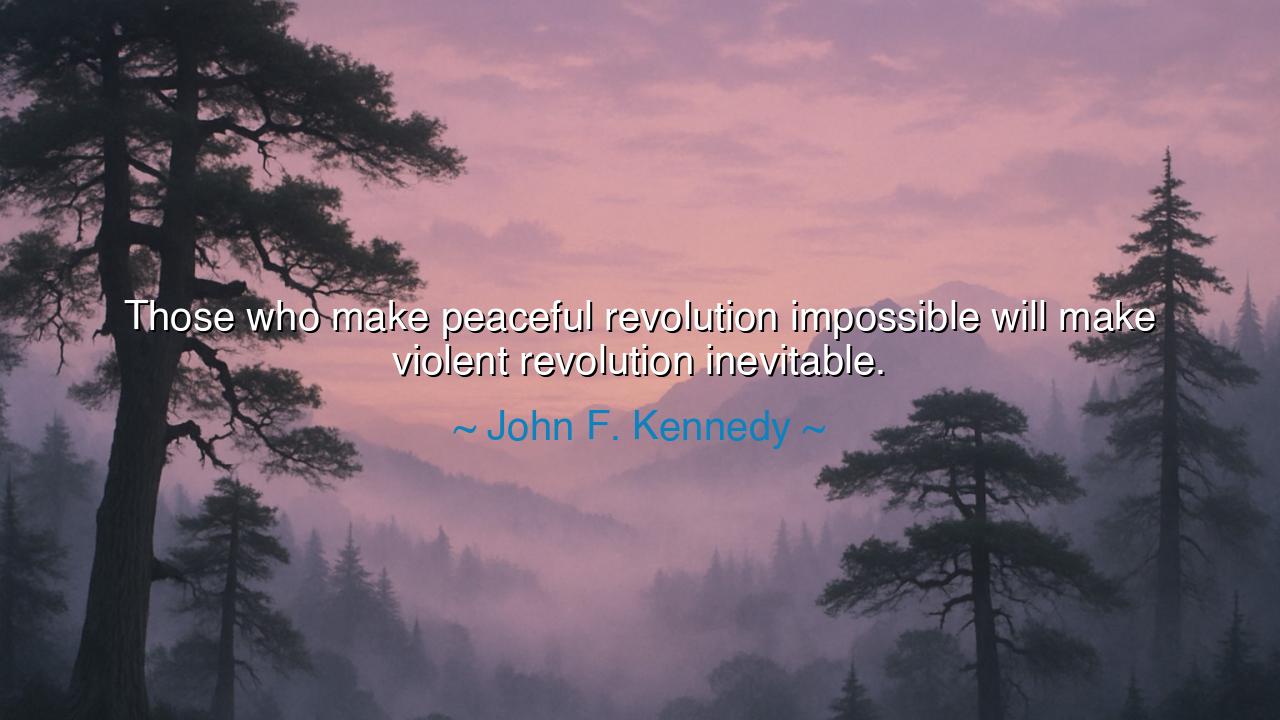
Those who make peaceful revolution impossible will make violent






The words of John F. Kennedy — “Those who make peaceful revolution impossible will make violent revolution inevitable.” — are as sharp as a sword and as heavy as a bell tolling through the ages. They warn rulers and citizens alike that when the door to reform is bolted shut, the people will not cease to knock — they will break it down. For the human spirit cannot be silenced forever; justice denied breeds not submission, but fury. Peaceful revolution is the path of reason, dialogue, and dignity; when it is denied, the pent-up fire of the oppressed bursts forth as violent revolution, a storm that no power can fully contain.
Kennedy spoke these words in 1962, amid the throes of the Cold War, when the clash between freedom and tyranny was not abstract but pressing. He saw that governments which deny the people their rightful voice sow the seeds of their own destruction. His wisdom was not new, but an echo of truths long known: when injustice reigns without remedy, the oppressed rise not because they desire chaos, but because no other road is left to them. Peaceful revolution is the safety valve of society; to block it is to invite the explosion.
History offers countless examples to prove this truth. In France, the people cried out for reform, for bread, for dignity. Their kings gave them none, dismissing their pleas with arrogance and waste. So the French Revolution came, first with words and assemblies, but when stone walls and royal stubbornness silenced those efforts, the guillotine rose. What might have been resolved by measured change was instead drowned in blood, for the denial of peaceful reform made violence inevitable.
By contrast, look to India under British rule. There, under Mahatma Gandhi, the people found a way of peaceful revolution through nonviolent resistance. It was not easy, nor free of suffering, but the refusal to answer injustice with violence preserved the soul of the movement. And because the people were allowed, however painfully, to organize and press their cause, the storm of bloodshed was lessened. The British, faced with the moral weight of Gandhi’s struggle, eventually yielded. Where peace was given room to breathe, violence was averted.
Kennedy’s words remind us that violent revolution is not born of hatred alone, but of desperation. It comes when the avenues of hope are walled off. When rulers fear change, when they silence voices, when they crush movements of reform, they believe they are preserving order. In truth, they are planting the seeds of chaos. It is far wiser, far nobler, to permit the winds of peaceful revolution, to allow grievances to be heard and addressed, than to face the hurricane of rage that follows when they are denied.
The lesson is clear: do not resist the tide of justice. Whether in the governance of nations or in the dealings of families and communities, always leave room for change, for dialogue, for reform. If you close your heart to the call for fairness, the pressure will build until it bursts. But if you listen, if you open the gates to peaceful revolution, then the transformation can come without the agony of destruction.
Practical wisdom follows. As citizens, cherish and protect the channels of peaceful change: the right to speak, to vote, to gather, to demand better. As leaders, never fear the demands of the people, for to meet them with openness strengthens society, while to silence them weakens it. And in personal life, when conflict arises, remember: suppressing another’s pain only ensures greater strife later. Seek resolution early, humbly, and with courage.
So remember, child of tomorrow: peaceful revolution is the voice of hope, violent revolution the cry of despair. Kennedy’s words carry the weight of history and the warning of prophecy: nurture peace, allow change, and honor the dignity of all — for if you make peace impossible, you make war certain. And to choose such folly is to invite ruin upon yourself and upon the generations that follow.






AAdministratorAdministrator
Welcome, honored guests. Please leave a comment, we will respond soon